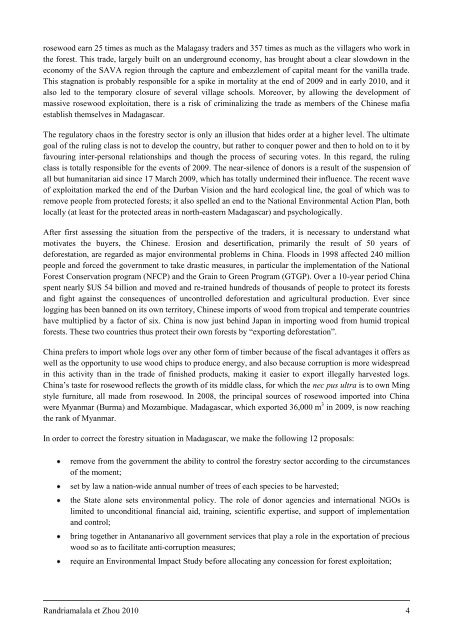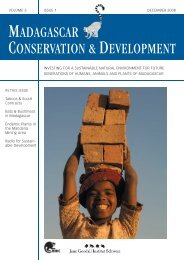Bois de rose de Madagascar - Madagascar Wildlife Conservation
Bois de rose de Madagascar - Madagascar Wildlife Conservation
Bois de rose de Madagascar - Madagascar Wildlife Conservation
You also want an ePaper? Increase the reach of your titles
YUMPU automatically turns print PDFs into web optimized ePapers that Google loves.
osewood earn 25 times as much as the Malagasy tra<strong>de</strong>rs and 357 times as much as the villagers who work in<br />
the forest. This tra<strong>de</strong>, largely built on an un<strong>de</strong>rground economy, has brought about a clear slowdown in the<br />
economy of the SAVA region through the capture and embezzlement of capital meant for the vanilla tra<strong>de</strong>.<br />
This stagnation is probably responsible for a spike in mortality at the end of 2009 and in early 2010, and it<br />
also led to the temporary closure of several village schools. Moreover, by allowing the <strong>de</strong>velopment of<br />
massive <strong>rose</strong>wood exploitation, there is a risk of criminalizing the tra<strong>de</strong> as members of the Chinese mafia<br />
establish themselves in <strong>Madagascar</strong>.<br />
The regulatory chaos in the forestry sector is only an illusion that hi<strong>de</strong>s or<strong>de</strong>r at a higher level. The ultimate<br />
goal of the ruling class is not to <strong>de</strong>velop the country, but rather to conquer power and then to hold on to it by<br />
favouring inter-personal relationships and though the process of securing votes. In this regard, the ruling<br />
class is totally responsible for the events of 2009. The near-silence of donors is a result of the suspension of<br />
all but humanitarian aid since 17 March 2009, which has totally un<strong>de</strong>rmined their influence. The recent wave<br />
of exploitation marked the end of the Durban Vision and the hard ecological line, the goal of which was to<br />
remove people from protected forests; it also spelled an end to the National Environmental Action Plan, both<br />
locally (at least for the protected areas in north-eastern <strong>Madagascar</strong>) and psychologically.<br />
After first assessing the situation from the perspective of the tra<strong>de</strong>rs, it is necessary to un<strong>de</strong>rstand what<br />
motivates the buyers, the Chinese. Erosion and <strong>de</strong>sertification, primarily the result of 50 years of<br />
<strong>de</strong>forestation, are regar<strong>de</strong>d as major environmental problems in China. Floods in 1998 affected 240 million<br />
people and forced the government to take drastic measures, in particular the implementation of the National<br />
Forest <strong>Conservation</strong> program (NFCP) and the Grain to Green Program (GTGP). Over a 10-year period China<br />
spent nearly $US 54 billion and moved and re-trained hundreds of thousands of people to protect its forests<br />
and fight against the consequences of uncontrolled <strong>de</strong>forestation and agricultural production. Ever since<br />
logging has been banned on its own territory, Chinese imports of wood from tropical and temperate countries<br />
have multiplied by a factor of six. China is now just behind Japan in importing wood from humid tropical<br />
forests. These two countries thus protect their own forests by ―exporting <strong>de</strong>forestation‖.<br />
China prefers to import whole logs over any other form of timber because of the fiscal advantages it offers as<br />
well as the opportunity to use wood chips to produce energy, and also because corruption is more wi<strong>de</strong>spread<br />
in this activity than in the tra<strong>de</strong> of finished products, making it easier to export illegally harvested logs.<br />
China‘s taste for <strong>rose</strong>wood reflects the growth of its middle class, for which the nec pus ultra is to own Ming<br />
style furniture, all ma<strong>de</strong> from <strong>rose</strong>wood. In 2008, the principal sources of <strong>rose</strong>wood imported into China<br />
were Myanmar (Burma) and Mozambique. <strong>Madagascar</strong>, which exported 36,000 m 3 in 2009, is now reaching<br />
the rank of Myanmar.<br />
In or<strong>de</strong>r to correct the forestry situation in <strong>Madagascar</strong>, we make the following 12 proposals:<br />
remove from the government the ability to control the forestry sector according to the circumstances<br />
of the moment;<br />
set by law a nation-wi<strong>de</strong> annual number of trees of each species to be harvested;<br />
the State alone sets environmental policy. The role of donor agencies and international NGOs is<br />
limited to unconditional financial aid, training, scientific expertise, and support of implementation<br />
and control;<br />
bring together in Antananarivo all government services that play a role in the exportation of precious<br />
wood so as to facilitate anti-corruption measures;<br />
require an Environmental Impact Study before allocating any concession for forest exploitation;<br />
Randriamalala et Zhou 2010 4



